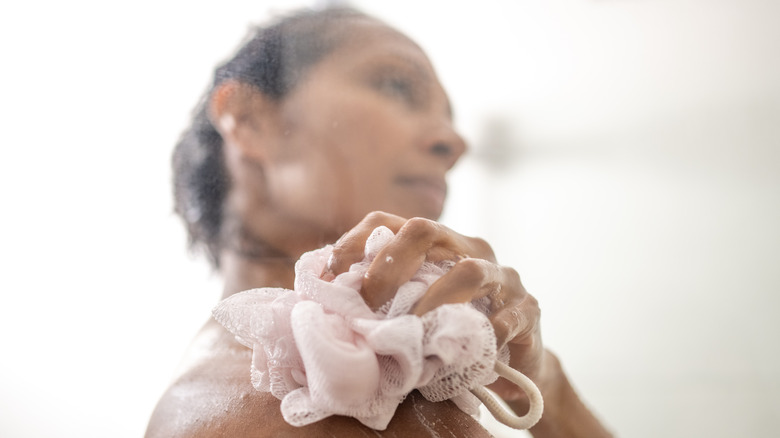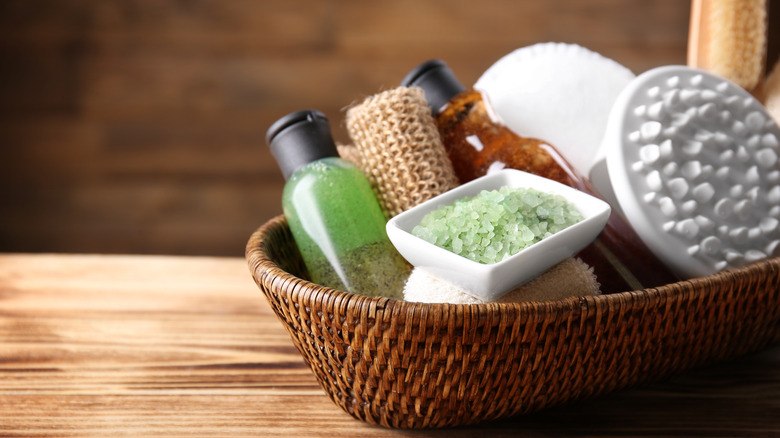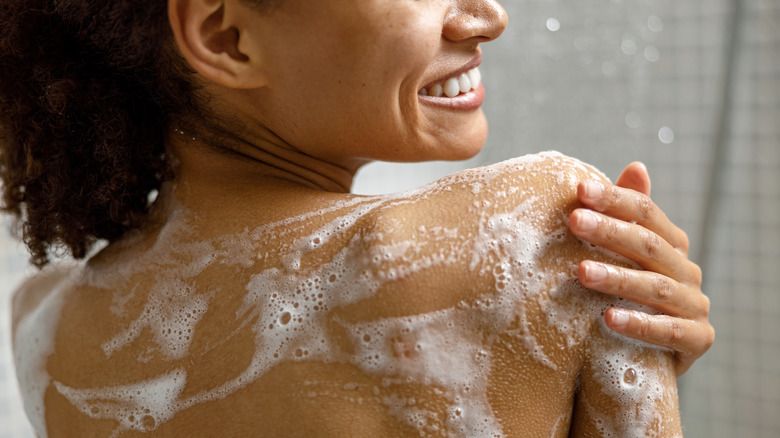Time To Ditch Your Scrubbing Tools — Your Hands Are The Most Hygienic Way To Wash Your Body
Bathing is one of the best therapies and an important part of every self-care routine. Whether you crawl into a bubble bath or take shelter in a hot shower after a long day, washing the world away feels amazing. But as much as scrubbing up and down is good for both the body and the mind, your scrubbing tools may not be as friendly as you thought.
"Mold can harbor in loofahs and sponges alike, as well as germs, dead skin cells, and remnants of dirt, oil, and grime that we scrub off our bodies," board-certified dermatopathologist Gretchen W. Frieling, MD told Real Simple. "This can cause infection if washing an open cut, trap bacteria inside your pores, and prevent you from really cleansing yourself from germs." Because of this — believe it or not — washing your body with your hands is the best way to stay extra squeaky clean and avoid possible infection.
"It's best to just wash with our hands," dermatologist Erum Ilyas, MD, MBE, FAAD told Oprah Daily. "Loofahs have been well-documented reservoirs of bacteria. They have been shown to grow Pseudomonas, Klebsiella, Enterococcus, Staphylococcus, and more ... Meanwhile, our hands can be easily cleaned." That's why it's time to surrender the tools and learn to wash with your hands.
How scrubbing tools grow bacteria
Bacteria are everywhere and your body is no exception. But while some good bacteria can be beneficial for the upkeep of the body by staving away the bad bacteria, there's no guarantee that the bad bacteria won't employ a whole army of buddies and cause trouble. When bacteria are given a hospitable environment, they grow and multiply like Gremlins doused with water. Your shower and scrubbing tools, especially if you never fully dry them and keep them in the shower, are a bacteria house party just waiting to happen.
"Bacteria only need three things to grow," microbiologist Jason Tetro told Well + Good. "They need water, which they're going to have lots of [in the shower]; they're going to need food, which comes in the form of your skin, your oil, all the things that you're scrubbing off; and they need a nice temperature in order to grow." Even if you clean your shower once a week, that won't stop bacteria from having a dance party in your scrubbing tools.
How to properly wash your body
You can keep your showering tools as long as you're willing to properly clean them or replace them regularly. But the healthiest way to wash your body is with your hands and a cleanser. "A gentle, unscented cleanser should be used to clean the armpits, groin, and feet after shampooing and conditioning your hair," dermatologist Dr. Rachel Nazarian told Refinery29. "Soapy water runs over areas such as arms and legs throughout the shower, passively cleaning them." When it comes to exfoliating, instead of using a brush or loofa, turn to natural exfoliants "by using coconut oil mixed with used coffee grounds or granulated sugar," dermatologist Rachael Burns told Byrdie.
You also don't need to wash your body every day, according to Dr. Nazarian who said, "given the amount of sweating, oil production, and dirt it accumulates for most adults, I wouldn't recommend most people wash less than three times weekly." Then, if you want to keep your skin working as the barrier that it's supposed to be, immediately moisturize after getting out of the shower.
Showering or bathing should be a relaxing experience that's void of bacteria. While you'll never be able to escape all the bad bacteria out there, limiting the amount your body comes in contact with is always something you want to try to do.


